Peter MALONE
Saturday, 18 September 2021 19:20
Suspect
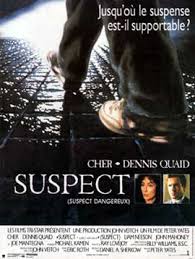
SUSPECT
US, 1987, 116 minutes, Colour.
Cher, Dennis Quaid, Liam Neeson, John Mahoney, Philip Bosco, Joe Mantegna.
Directed by Peter Yates.
Suspect is an interesting murder mystery, courtroom drama. It has Washington settings, including Capitol Hill and the American courts. It was directed by Peter Yates, director of a range of interesting films from Bullitt to The Friends of Eddie Coyle to The Dresser.
The central star is Cher, who gives a serious performance quite creditably as a government legal aide and lawyer. Dennis Quaid, very popular in the mid'80s, is a Washington lobbyist who is on jury duty and who decides to help the lawyer in the case. Liam Neeson (Lamb, The Mission) is the accused. There is very good support from John Mahoney as the presiding judge.
The film is not only interesting as a murder mystery but as a study of characters and interactions. It also has comment about political and judicial corruption.
1. Interesting and entertaining mystery, courtroom drama, drama of social comment?
2. The title, its references, sustaining interest? The style of the opening credits and the echoes of past Warner Bros. dramas? Pace, editing? Musical score and mood?
3. The use of Washington locations, the Potomac, winter? Capitol Hill, courts, homes, slums?
4. The quality of the mystery, the clues given? The fairness of the script? Holes and coincidences? The blend of contrivance and realism?
5. The opening with the judge, Elizabeth Quinn, Christmas and winter, his position, his suicide? Elizabeth's death, the winter scene at the river, the hand, the arrest? Carl and his brutish behaviour? His hearing impediment? Kathleen appointed to be his lawyer?
6. Cher as Kathleen: screen presence, as a woman in herself, ambitions? Her discussions with Mort, friendship with him, the public defenders? lack of salary? Home, alone? Skills? Her being on the edge? Her introduction to Carl: brutish, his physical attack on her, getting nowhere, the realisation of his deafness, making progress? Getting the doctor because of his treatment by police? Her belief in him?
7. The court sequences: the skill of the lawyers, the presiding judge and his position, hostility towards Kathleen? Charlie Stella and his ability as a prosecutor? The testing of the jurors and their prejudices? The interrogation of Eddie? The situation, evidence, Kathleen wanting stays of hearing, needing Michael as a witness?
8. Eddie and his work on Capitol Hill, his boss, political parties, lobbying, the farm vote and interests? Senators? Grace and his lobbying her, her assertions about integrity, the sexual liaison, his winning the vote? Prostituting himself? Contacts, Paul Gray and the Attorney's Department? His being called up as a juror? Being interrogated? Caught as a juror? His interest in the case? His observation about the left-handedness of Carl? Phone call and information to Kathleen?
9. Friendship and conflict between Eddie and Kathleen? The law, breaking the law, contacts, concealing the contacts, her demonstration about the left-handedness? Eddie and his phone call? Michael and his finding him dead in the slums? Buying back the links from the vagrant lady, having to give up his shoes and socks? Asking Paul Gray information? The warning? The key and Kathleen going through the files? Working in the library - observed by the judge? Inquiries about the car registration and parking? The attendant and his wrong numbers?
10. Kathleen and her work, relationship with the judge, interviews, frustration, the appeal, studying, the contacts with Eddie, the personal relationship?
11. The judge, the question of his promotion, not wanting to sit on the trial? His treatment of objections, calling the lawyers into Chambers? His severity with Kathleen, the rules? Observing them in the library? The home party? Friendship with Paul Gray? The irony of the information gained, the revelation of the truth, his being called to the dock, his arm bleeding?
12. Charlie Stella and the prosecution, the interplay with the defender, with the jury?
13. Paul Gray and the Attorney-General's Department. the files, the 1968 cases, audience suspicion. his arrival in court? The screenplay's suggestion that he was the villain? The contrast with the judge? The revelation of the tape recording, Elizabeth Quinn's blackmail, Judge Helm's decision, humiliation at being passed over?
14. Carl: looking wild, the slums and the types, the investigator looking for Michael and his being slashed, Michael as a vagrant? The Vietnam background, Carl's story, hospital, violence, separation from his wife? Going deaf? The car park. the car, robbing the corpse? The police treatment of him, his being deaf. his gradually being spruced up for the case? The use of the computer? The interrogation, his innocence, a victim?
15. Themes of the judiciary. the courts, politics, lobbying, corruption? In the context of the murder mystery?
Published in Movie Reviews
Published in
Movie Reviews
Tagged under
Saturday, 18 September 2021 19:20
Survival Quest
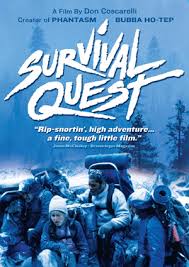
SURVIVAL QUEST
US, 1989, 96 minutes, Colour.
Lance Henriksen, Catherine Keener, Dermot Mulroney.
Directed by Don Coscarelli.
A group of students meet with a group of gung-ho mercenaries - and inevitably they clash. The film was written and directed by Don Coscarelli, director of Phantasm and the sword and sorcery film The Beastmaster. There is message about harmony with nature, there is also message about violence with guns. While the film has a great deal of action, it is consistent with its message - although there is a final explosion to destroy the enemy. Entertaining of its kind.
1. A blend of action and nature film? Themes of ecology, violence and gung-ho use of weapons in the '80s?
2. The beauty of the Colorado locations, the ruggedness of the wilderness? Musical score?
3. Survival Quest and its establishment in 1959? Aims and methods of training? Personnel? harmony with nature? The strengthening of individual skills, overcoming of fears? The importance of teamwork not one winning, but all winning? The contrast with the mercenaries and their gung-ho attitudes? Seeing 'men'? Violence of predators?
4. The mercenaries and Jake: the tough training, his attitudes towards his men'? The pep talk, training, taking them unawares? The cruel morale? In the plane, spurning of the Survival Quest group? The confrontation with hank and the others? The tough manoeuvres? The shooting of the deer? hank and his threatening Jake, the taking of the knife? The tying up of the four for catching? Raider and his, confrontation with Hank, the shooting of Hank, and the humiliating killing of Jake, according to his own principles? The vengeance chase by the mercenaries? The confrontations, killing their own men? The final explosion? The point being made by the violence of these men?
5. The contrast with the Survival Quest group and their hopes? Introduction to Hank, his falling off the roof and showing them trust? Making Joel fall off? The different trainings and overcom-ing their fears? Going out into the wilderness, his relating with them individually, helping then, to work as a group, discreetly exercising leadership, not telling their, what to do? Their solo days and his interventions? Rescues?
6. Hank and his life story, orphan, his father, gratitude for showing him the wilderness? Toughness, training? The contrast with Jake and the others? His particularly helping Gray? His being shot, hiding, cauterising his wound, surviving?
7. Cheryl and the separation from her husband, lagging behind on the first day, elected as leader and exercising leadership?
8. Olivia and her fiance, wanting to do her own thing, attracted towards Gray, the sexual encounter, grief at the end - and joy?
9. Gray and his arrival, the convict, sullen, the attempt to escape, his return, the attraction towards Olivia, the friendliness of Hank, the final plan and his daring? Discussion of life stories, his journal? His surviving?
10. Rial and his age, trying out the manoeuvre, his being a father-figure, his being shot, determined to walk?
11. Jeff and Joey, Jeff and his haughtiness, his rope breaking on the cliff, Olivia helping? His becoming part of the group? Joey as genial, falling off the roof, the encounter with the little bear and then the big bear? His foot caught in the log?
12. The enjoyment of the wilderness, its beautiful ruggedness, going solo and reflecting on the meaning of life? The escape and the decision-making, the leap into the river, downriver, the rope across the river, floating on the log? The two mercenaries and their help, betrayal, the murdered mercenaries?
13. The sense of achievement? Audiences identifying with this harmony with nature, exertion of efforts, teamwork and achievement?
Published in Movie Reviews
Published in
Movie Reviews
Tagged under
Saturday, 18 September 2021 19:20
Surprise Package
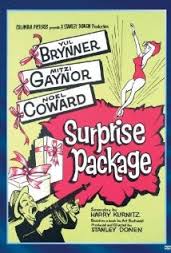
SURPRISE PACKAGE
UK, 1960, 100 minutes, Black and white.
Yul Brynner, Noel Coward, Mitzi Gaynor, Bill Nagy, Eric Pohlmann, George Colouris, Warren Mitchell.
Directed by Stanley Donen.
Surprise Package is a slight entertaining gangster film. It has overtones of Damon Runyon, especially in Yul Brynner's gangster character. A bonus in the film is Noel Coward's Aegean king in exile. The script comes from a novel ('A Gift From The Boys') by journalist Art Buchwald. Direction is by Stanley Donen who made an impact with his musicals On The Town and Singin' In The Rain with Gene Kelly. He was making comedies at this time e.g Indiscreet, The Grass Is Greener. The film is pleasant but not outstanding.
1. The tradition of the Damon Runyon gangster comedy? The particular American style and its appeal? The atmosphere of the '30s? How well did it transfer to the '50s and '60s?
2. The work of Stanley Donen in musicals, sophisticated comedies? The styles of the cast? The contribution of the music? Songs? The atmosphere of New York, the contrast with Greece? The humour of the credits?
3. A world of humour? A mirror to the real world - and amusing parody? The 'what if…? approach to the comedy? The value of this kind of entertainment?
4. Yul Brynner's style as a comic gangster? His prowess in the United States, the gangster type, his being deported? His intelligence and lack of it? Things going wrong? His relationship with the king? The doctor and the various people on the island? Tibor and his help? Gabby - the on-and-on relationship? His scouting out the situations, surveillance? His self-image? The humour of his plan, his hat, being knocked out? The loss of the jewels? The gangster with the American dream?
5. The contrast with the king ~ Noel Coward's presence, articulation, wit? The humour of the comment on European and Asian politics? Anatolia and Britain? The comedy in his style? The girls at his villa? His wealth? The humorous presentation of fascist ideals? His loss of his position - and the humour of his being in the restaurant at the end?
6. Mitzi Gaynor's style as the chorus girl, glamour, her hesitations, her infatuation with the king, pleasure at the decoration? Love for Nico? The visit to the church? Concern about Tibor? Giving things away? The end?
7. The background of Anatolia - the doctor, his fat henchman, the temple? The ironies of the atmosphere of 1960 and old European kingdoms coming to an end, monarchs in exile?
8. The background of the Hungarians, atomic espionage? The pathos of Tibor's death?
9. The blend of Damon Runyon comic style with the atmosphere of the Cold War of the '50s?
10. The humour of the ending - the conventional ending to this kind of escapism?
Published in Movie Reviews
Published in
Movie Reviews
Tagged under
Saturday, 18 September 2021 19:20
Sure Thing, The

THE SURE THING
US, 1985, 90 minutes, Colour.
John Cusack, Daphne Zuniga, Boyd Gaines, Tim Robbins, Anthony Edwards, Lisa Jane Persky, Viveca Lindfors, Nicolette Sheridan.
Directed by Rob Reiner.
The Sure Thing is a pleasing romantic comedy about college students in America in the '80s. It is something of a teenager's 10. The sure thing is the fantasy sex figure for the male - who turns out to be far less than a 10.
The film was directed by comedian Rob Reiner (All in the Family) who began a directing career with the hilarious satire on English rock groups, This Is Spinal Tap. Here he directs a comedy that is in contrast with the crude and raucous trend in college films of the early '80s (Porky's and its sequels and imitations). An unknown cast of youngsters does very well and earns audience sympathy. Reiner's skill at comedy means that there are many laughs. A pleasing return to American traditional romances with the dash of the screwball comedy (like It Happened one Night).
1. A youth romance film of the '80s? The focus on college students, dreams and fantasies, reality? Reaction to the crude genre of the period?
2. Americana, high school and colleges, mores? The contrast with the North East and California? Stereotypes and realism? Situations, locations? The background of contemporary songs?
3. The traditions of romance, shyness, teenagers? The road movies and screwball comedy? Pleasingly updated to the '80s?
4. The skill of the director and the screenwriters in eliciting laughs, giving us sympathetic characters, satirising others? Their touch for Americana? The blend of sentiment and toughness? An emphasis on pleasantness, niceness, goodness?
5. The title and the opening image? The descriptions of the girl as the sure thing - male fantasy, self-assertion, chauvinism? The fantasy sequences where Gib imagined his relationship with the sure thing? What happened in fact? Alison's reaction? The contrast with the sure thing and the real thing?
6. Lance and his talk, self-centredness, lack of morals, attitude towards women? Choosing California? Lifestyle, letters, postcards? The set-up for Gib? Arranging the party and Gib's rejection? The party sequences, the pools etc. the familiar stereotypes from the teenage comedy films?
7. Gib and his quiet nature, reserve, looking at the stars (and his reminiscences with Alison about his loneliness)? His serious talk, being on the outer? Yet being on the sexual prowl? Right In classes? His choices? His room-mate and the girlfriend and his eating in the corridor? Lance? The encounter with Alison? The swimming pool and her ignoring him? The date and the discussions? His making a pass at her on the roof? Discovering her in the car to California? Junk food, fights, commenting on her repression, his reaction to her leaning out the window and the police ticket? Being put out by the drivers? On the road? Anger, talk? Jumping on the utility and saving her from being molested? The motel, her response to Jason., his drinking, the buddies and singing in the bar? Being caught in the rain? The more mellow relationship, the credit card, buying the rose, the dinner? Their being picked up by the truck - and his philosophy of the sure thing? The party, Alison's jealousy? His encounter with the glamorous
girl, her being subservient to him - without a thought in her head? The cut in editing and the return to the classroom -and his essay and declaration of love for Alison?
8. Alison and her seriousness, Dr. Taub and her comments, the essay, her diary and appointments, her reaction to Gib, ignoring him, the swimming, the Friday night, the pass on the roof? Her exasperation in the car, her removing her clothes and leaning out of the car? Out on the road? Antagonism, eating his junk food? The molester and her being rescued? The phone calls to Jason? Her change of feelings towards Gib? The platonic relationship? The overhearing of the theory of the sure thing? Her disappointment? Meeting Jason, seeing him with new eyes, his prim manner? Her wanting to go to the party, jealousy of Gib? The classroom - and the happy ending?
9. Jason and the prim student, his repressed attitudes, his snobbery, relating to Alison, breaking off the relationship?
10. The sure thing - attractive, presented as the sex symbol, her behaviour in Gib's fantasies, in real life, dominated by Lance, trying to please Gib?
11. The couple in the car, their good humour, songs? Their putting the couple out? The molester and his loneliness spiel? The lorry driver and his hurrying them to California?
12. Dr. Taub and her comments on essays? The absence of representatives of the adult world in the film?
13. The '80s, permissive styles, reaction against permissiveness? Sure things and real things?
Published in Movie Reviews
Published in
Movie Reviews
Tagged under
Saturday, 18 September 2021 19:20
Support Your Local Sheriff
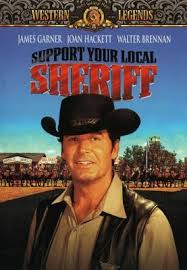
SUPPORT YOUR LOCAL SHERIFF
US, 1968, 93 minutes, Colour.
James Garner, Joan Hackett, Walter Brennan, Harry Morgan, Jack Elam, Bruce Dern, Henry Jones.
Directed by Burt Kennedy.
Support Your Local Sheriff guarantees continual laughter. It is a hilarious spoof of the typical western. It takes the expected conventions and with some gentleness it shows commonsense winning out over rock-jawed toughness. Even the murderer stays in a cell without bars. James Garner is very much at home in this type of comedy. He is well supported by Joan Hackett and Walter Brennan in enjoyable roles. The film was made by Burt Kennedy who has specialised in a number of small-budgeted but enjoyable westerns. for example, The Rounders, The War Wagon, The Deserter, The Train Robbers.
1. Audience response to westerns and comedies? The basic response to this comedy-western? The title recapitulating the themes and their irony?
2. The critics were full of praise for this film. Why? Did it deserve the praise?
3. Comment on the conventions of the western that it used: the gunslinger, the sheriff, gold, the boom town, the landowning family, the shootout, romance. How enjoyably were these presented and parodied? An affectionate laugh at the western conventions?
4. How well did the film create an atmosphere at the beginning: the funeral, the sudden awareness of the gold, and then the riot? An indication of things to come? And indications of the types of character, including Prudy?
5. The film's comment on the growth of the town and its lawlessness, Madam Orr and her house, the so-called respectable citizens? How were these parodied?
6. The expected villainous family, the Danbys? How typical of westerns, their toughness in word and action?
7. How enjoyable and engaging a hero was Jason? James Garner and his personality and style, his capacity for deadpan comedy? Jason and his aims to go to Australia? The reasons for his accepting the role of sheriff? The humour in his methods, for example, hosing down those fighting, putting the prisoner in a prison without bars, painting a red spot for blood? His finger in Danby's gun? His capacity for wisecrack comment? The comment on the role of the sheriff in the west? The humour and irony of his making Jake his deputy? How comic a character was Jake?
8. How attractive a heroine was Prudy? Comment on her belonging to the town, her relationship with her father as Mayor? Her being caught in all kinds of strange situations for example in the mud, up the tree? Her helping of the sheriff, falling in love with him? How enjoyable a heroic character of the west?
9. The detailed portrayal of the leading citizens, the hypocrisy, especially with trying to get a sheriff and pay him? Their being caught in Madam Orr's house during the shootout?
10. The action sequences with the Danby roundup, the preparation for the shootout, the creation of atmosphere? Jason's handling of the situation with the cannon? The irony of its blowing up Madam Orr's house?
11. How expected and appropriate was the happy ending? Why?
12. How do westerns show the good and bad of the American heritage? How well was it portrayed here, highlighted by parody and the audience's ability to laugh?
Published in Movie Reviews
Published in
Movie Reviews
Tagged under
Saturday, 18 September 2021 19:20
Support Your Local Gunfighter
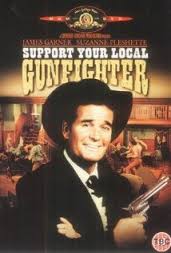
SUPPORT YOUR LOCAL GUNFIGHTER
US, 1971, 92 minutes, Colour.
James Garner, Suzanne Pleshette, Jack Elam, Joan Blondell, Harry Morgan.
Directed by Burt Kennedy.
Support Your Local Gunfighter is in some ways a sequel to Support Your Local Sheriff. Once again it stars James Garner who is very much at home in this kind of droll spoof of the West. This time the heroine is Suzanne Pleshette. And there's a stock company of faces familiar from the ordinary western all sharing in the comedy. The original title was Latigo, but the title has changed to put it in the line of the predecessor. However, it falls far short in its impact as a satire and as a comedy. Both films were written and directed by Burt Kennedy. He is a specialist in this genre. Support Your Local Gunfighter is somewhat disappointing in the company of his other westerns.
1. How successful a spoof of conventional westerns: presentation of the hero and his exploits,, a western town and its characters. the role of gunfighters? How clever was the parody, how funny?
2. How do such parodies pay homage to the popularity of westerns? What view did this film take in support of westerns, criticism of westerns?
3. The importance of the colour, scenery, musical background, especially the theme for Latigo. James Garner and his style, the comic supporting actors?
4. The conventionality of the plot? Audience expectations from these characters and situations? Their being fulfilled, fun poked at them, various expectations thwarted by the jokes?
5. Latigo Smith as the hero of this kind of film: his running out on Goldie, the satire in his tattoo. the questions about his health. the visualizing of his compulsion for roulette, his reliance on tough talk to get people away from him. his exercising his skill as a conman. talking the two angry women out of their anger, the final gunfighting exhibition. the happy ending?
6. The satire in the presentation of Patience, the contradiction to the western heroine? Her shooting. loud-mouthed nature, ambitions to go to Finishing School? The humour in the way that she kissed and shot? Her desperation to get out? The happy ending?
7. The focus of the satire on Jud and the irony of his being promoted as 'Swifty Morgan, the gunfighter'? His almost believing his own propaganda? The fact that he did nothing and still frightened the people? The contrast with the real Swifty Morgan? The train-ride of the real gunfighter, his confrontation at the end?
8. The satire on Barton and the mining interests, his flirtation with his fiancee, the fact that she was the sister of the villainous Colonel with his sinister laugh etc.? The satire on the town elders?
9. The satire in the gunfights themselves, the squabble with Jenny and Goldie?
10. The presentation of Jenny as with a heart of gold, the story of the spur, her furnishing Latigo with clothes and a room?
11. How successful was the film in building up to a climax? Making it funny?
12. The value of this kind of humour, parody on the West, a different perspective on the western genre?
Published in Movie Reviews
Published in
Movie Reviews
Tagged under
Saturday, 18 September 2021 19:20
Supersnooper

SUPERSNOOPER
US, 1980, 106 minutes, Colour.
Terence Hill, Ernest Borgnine. Joanne Dru, Marc Lawrence.
Directed by Sergio Corbucci.
Supersnooper is an enjoyable Italian/American co-production, a star vehicle for Terence Hill. Popular from his Trinity films and other films with Bud Spencer, he can hold a film on his won - especially his American debut in Mr. Billion. He also teamed with Gene Hackman and Catherine Deneuve in Dick Francis' March or Die.
The material in this film is similar to that of the Italian vehicles - director Sergio Corbucci directed Hill and Spencer in Odds And Evens.
The Florida setting is attractively presented. Hill portrays Dave Speed, a genial rookie policeman. Ernest Borgnine enjoys himself as his Captain. There is an exaggerated sinister performance by Marc Lawrence as a criminal chief and Joanne Dru makes a comeback as a fading film star adored by Borgnine - but who is criminal. There is a whole lot of knockabout humour, restrained in general. Because Hill portrays a policeman affected by re-entry of a rocket, he has superhuman powers which he uses to humorous and dramatic effect in breaking a drug ring. However, if he sees the colour red, he is rendered powerless.
Supersnooper is also a pleasant wish fulfilment for those who would like our cities cleaned up - police with superhuman powers to avenge rights and eradicate wrongs. However, it is all done with a very pleasant light touch and is a pleasing addition to the Terence Hill films. Engaging for non-demanding audiences.
Published in Movie Reviews
Published in
Movie Reviews
Tagged under
Saturday, 18 September 2021 19:20
Superman 3
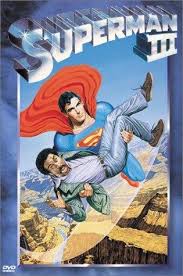
SUPERMAN 3
US, 1983, 119 minutes, Colour.
Christopher Reeve, Richard Pryor, Jackie Cooper, Margot Kidder, Annette O'Toole, Annie Ross, Pamela Stephenson, Robert Vaughn.
Directed by Richard Lester.
While this film was in production, a tentative title was Superman vs Superman. It was an example of the hero and his dark side (as in Spiderman 3).
Some synthetic kryptonite is laced with tar product and contaminates the man of steel’s power. Clark Kent emerges as the authentic person. Superman himself is the dark Superman. This is interesting, psychologically speaking as well as dramatically, for the inner conflict of Superman/Clark Kent.
Robert Vaughn is the villain, wanting to take over the world economically. He chances on a computer geek, played by Richard Pryor, who is able to be his instrument of destruction. The regular cast is back including Jackie Cooper as Perry White, Marc McClure? as Jimmy Olson and some glimpses of Margot Kidder as Lois Lane. However, the romantic interest this time is Annette O’Toole? as Lana Lang, a school sweetheart of Clark Kent.
The film is humorous, perhaps not as serious as the earlier films, although the underlying theme of the split in Superman’s personality is serious enough. This was the culmination of a trilogy of Superman films. However, Superman 4 was released about five years later.
The franchise was reinvigorated in 2006 with Superman Returns, directed by Bryan Singer.
1. An enjoyable Superman entertainment? Comparisons with the first two films? Expectations? Differences?
2. The opening tone - the Pink Panther style pratfall comedy? Relationship to the plot? The focus on New York, city streets, accidents? The lower key than the previous cosmic openings? Superman in an American domestic situation? In Metropolis? The film as a piece of Americana - New York, Smallville? multinationals, the growth of the computer industry? The American dream and greedy control? The psychological background - the confrontation with the evil and shadow self? Stunt work? A satisfying blend for entertainment? Panavision photography, locations. special effects and stunts? The musical score? New songs?
3. The background of the Superman comic strip? How many dimensions for characters and situations in this film? The issues, their importance? Matters of life and death? Comic strip characters and situations? Christopher Reeve as Superman - giving an added dimension to his portrayal?
4. An entertaining plot - the focus on Clark and Lana, the emphasis on small-town American romance? The complications with Webster and multinational greed and control? A personification of evil? The American black comedy style with Richard Pryor as Gus? Gus and computers? Good. evil. clash? The vindication of good?
5. The portrait of Clark Kent - at work in the office. his skill as a newspaper reporter, the meek cover for Superman? The attraction towards Lois Lane - the initial encounter, her holiday, her jealous reaction at his introduction to Lana? Clark as a product of Smallville? His friends at home, the re-acquaintance with Lana and her son, his enjoying their company? The clash with Buddy? Clark always on the alert for Superman situations? His opportunities for saving people, for putting out fires? Clark's awkwardness as a cover? The more human touch with his response to Lana - and the ending?
6. Audience expectations of Superman to save people - the car and the drowning, the boy, the factory - and moving the dam? The bringing up of these points later when he changed personality? The speeches about Superman and his prowess? His becoming evil and turning,in the middle of his patriotic speech? Pamela Stephenson as the comic villainess - and Superman refusing to rescue her? His seduction by her wiles? His shifting the Tower of Pisa, blowing out the Olympic Games torch, breaking the tanker and spreading oil in the ocean? Superman as a boozer and a down-and-out? His fight with his evil self - and Clark Kent winning? The return of Superman, the confrontation of enemies, the giant computer? And his saving the world?
7. Richard Pryor's comedy style as Gus - his being out of work, the comic situations of unemployment and the '80s, the dole, his getting a computer job, his innate success, his taking the half-cents and embezzling Webster, Webster finding him out, his spending, the confrontation, his power with computers, his being asked to control the weather in Colombia and destroy the coffee crops - and his success? His going to Smallville, the comic sequence of his opening up the computer? The encounter with Buddy? The control of the weather, the tankers? His change of heart? Antagonism towards Webster and his sister? The visit to the Grand Canyon, the donkey ride? His confrontation with Superman - and his unwilling flight at the end? Gus and his final patter and his incorrigibility? Richard Pryor's comic verbal style and clowning?
8. Webster as the personification of evil, his reputation for philanthropy, his offices and apartment and their decor, his intense language and its self-centredness, Robert Vaughn's stern ironic style? The plausibility of his greed? His household, his valet, his relationship with his sister? With his mistress -and her being a closet intellectual? The control of coffee, the control of the ships, the giant computer? The comic touches for h-is wealth - his ski run on the top of the city apartment? His disappointment with Gus, the final confrontation, his greed and comeuppance?
9. The contrast with Vera - her masculine approach, toughness, evil, her being possessed by the computer?
10. Pamela Stephenson's comic style as the dizzy blonde, her reading Kant and his philosophy, her knowledge of computers, the attempt to seduce Superman?
11. Jimmy as reporter, the factory story, his covering it? Perry White and the paper, the Bingo and the drawing of the numbers, the computer going berserk - and the couple winning their prize, have terrible time in the bad weather in Colombia?
12. The glimpse of Lois Lane - the comparisons with her role in the earlier films? Her love for Superman? Regard for Clark?
13. Lana as the attractive hometown girl? Her story, marriage, son, separation? The reunion, the party, the organisation, Buddy and his attentions? Her relationship with her son? The picnic with Clark and Superman saving her son? moving out of Smallville, going to New York? In the subway when the lights went out? The happy ending with Clark?
14. The background of computers and their popularity, their taking control of people's lives and their management of lives? The control of cities, weather, satellites? Data and information? The giant computer as a machine 'personification’ of evil?
15. The background of the coffee crops, South America, the presentation of the poverty, the wedding, the religious rituals - and the intrusion of, not an act of God, but an act of the computer?
16. The oil, the ships - and the British refusing to give in? Superman's breaking the tanker - and his later repentance and repairing it?
17. The portrait of Smallville U.S.A. - the Mid-American? town and the memories of the growing up, school, parties? The careers of the middle American adults?
18. The psychological theme of Superman confronted by his evil self, his shadow? The use of Krypton? His degeneration as a person? The humour of his malice and disrupting things? The ultimate fight with Clark and his winning? The finale with making the Tower of Pisa lean again?
19. The popularity of comic strips, the '70s and '80s with comic strip heroes brought to life on the screen? Embodying the aspirations and ambitions of the period?
Published in Movie Reviews
Published in
Movie Reviews
Tagged under
Saturday, 18 September 2021 19:20
Superman II
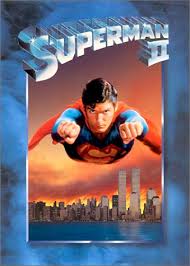
SUPERMAN II
US, 1980, 127 minutes, Colour.
Christopher Reeve, Gene Hackman, Margot Kidder, Terence Stamp, Sarah Douglas, Valerie Perrine, Susannah York, Jackie Cooper.
Directed by Richard Lester.
In 1978 audiences were eager for a sequel. In 1980 they were satisfied. Director of sharp, satirical comedies Richard Lester has highlighted the comic aspects of Superman's adventures and character (not forgetting his solemn origins with Susannah York instructing her son). After foiling terrorists on the Eiffel Tower, Superman has to confront the three enemies from Krypton, headed well by Terence Stamp, who have equal powers to his. He also has to make decisions about his love for Lois Lane. The action is entertaining, frequently spectacular. Christopher Reeve is most affable. Many characters from the original make welcome, if brief, reappearances. This is an imaginative, lively and satisfying series.
1. The popularity of Superman over the decades: the comics and the capturing of the imagination of the '30s, American heroes, world heroes? The superhuman feats? Superman's success, the conquering of evil by good? The popularity of filmed versions over the decades? Why the popularity in the '70s and '80s?
2. The impact of the original film: the Krypton and significance sequences, the transition to the United States and the homeliness of the '30s and '40s, the comic world of Lex Luthor and his assistants, the newspaper world of the Daily Planet, the overtones of disaster films? The original film as a cinematic achievement of the '70s? Its recapitulation during the credits?
3. The quality of this sequel in itself, the particular tone given it by comedy director Richard Lester? His treatment of the characters. situations, comic and throwaway dialogue? His use of the symbolism of the first film? The role of the film as a sequel, the anticipation of a further sequel?
4. The initial adventure of the Eiffel Tower? The echo of terrorists, the media and interviews, Lois Lane interviewing people, intruding into the Eiffel Tower, being in danger? Superman coming to the rescue? The contrast with Clark Kent and his bumbling arrival at the office? His rescuing Lois and the reminder of the relationship of the two? The exploding of the nuclear bomb in space and its releasing the three villains? A satisfying introduction and the starting of a new plot?
5. General Zod and his assistants as the embodiment of evil? The prologue from the first film and their evil, judgment, imprisonment? Their vengeance against their jailer and his son? The irony of their being freed? Superman's mother giving the explanation and Lex Luthor hearing it? Their power, the humour of their encounter with the men on the moon and their killing them? Houston's incredulous reaction? The discovery of Earth - and thinking it Houston? Their going to the small midwestern town and their confrontations, destruction? The character of General Zod and the overtones of Lucifer and power? Ursa and evil woman? Non and his size, -ignorance? Leadership, power, cruelty?
6. The confrontation with the sheriff - and the comedy with the drawling sheriff and his small assistant? The siege of the town and the destruction, the various devices used by the villains - fire, shooting, throwing people around? The television coverage and the immediate spread of news of their power? The presentation of the President, the White House, the taking over of Washington, the President hiding and then capitulating? Humans humiliated before the villains from space? The need for Superman?
7. The character of Superman and the comparison with Clark Kent? Clark's bumbling and affable mistakes, making a fool of himself? Lois and her disregard for Clark, her infatuation with Superman? The humour of their visit to Niagara and the parody of the hotels for lovers? The boy falling over the falls and Superman's rescue? Lois Lane's realisation of the truth? Trying to test out Superman by falling into the river, Clark's saving her? Their discussions about Superman and his role, Superman's taking her to the North, the banquet and his getting the orchids etc.? Lois overhearing the message from his mother? Superman's willingness to become human for the sake of Lois' love? His becoming human, the love sequences, the drive south, the confrontation in the diner and Clark being bashed? Hearing the news and Clark's decision to return and regain his powers?
8. The sub-plot with Lex Luthor - Luthor and his comedy, his being the best criminal brain, his being in jail? Otis and the dumb assistant? The escape with the secretary, leaving Otis in jail? Luthor's trek to the North and taking his assistant with him? The discovery of the crystals, hearing the message? The recognition of General Zod, doing deals with him, arranging for Superman to come to Lois Lane, double-crossing Superman at the end? Gene Hackman's comedy touches as Luthor? The parody of the human villain?
9. Superman in action and audience enjoyment of these sequences: the Eiffel Tower. Niagara Falls, his renewing his strength, returning to New York and the confrontation with the villains?
10. The length of the film given to the battle and its detail, the intrusion to the offices of the Daily Planet, the fighting in the streets of New York and the spectacular feats? Down in the sewers, on top of the skyscrapers, the Coca Cola signs etc? The lifting of the bus with so many people in it? Superman seeming to be killed, to flee? The set-up for the final confrontation in Superman's home? His tricking Luthor and defeating the adversaries? Lois being in at the end?
11. The anti-climactic humorous ending with Clark returning to confront the bully in the diner? Lois and her disappointment at Superman's going to save the world? Clark kissing her and Lois forgetting that it had all happened? A satisfying ending for this sequel? Anticipation of a further sequel?
12. The appeal of the heroism, the treating of a comic strip character in a comic way? Unpretentious humour. even with spectacle? A modern embodiment of old legendary ideas of heroism and the saving of the world?
Published in Movie Reviews
Published in
Movie Reviews
Tagged under
Saturday, 18 September 2021 19:20
Supergirl
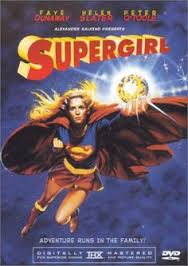
SUPERGIRL
US, 1984, 111 minutes, Colour.
Helen Slater, Faye Dunaway, Peter O'Toole, Mia Farrow, Peter Cook, Hart Bochner, Simon Ward.
Directed by Jeannot Szwarc.
Supergirl is another space extravaganza produced by the Salkind Brothers. It is based on comic strip characters - the cousin of Superman himself.
Newcomer Helen Slater plays Supergirl and her earthly persona Linda Lee quite attractively. She is surrounded, as in all these films, by a star cast. Faye Dunaway (a bit like Mommie Dearest again!) sends herself up as the wicked witch Selina. Brenda Vaccaro is funny as her associate. Peter O'Toole is the equivalent Alec Guinness role as Zaltar. Other stars appear fairly briefly including Mia Farrow, Peter Cook, Simon Ward. The hero is played by Hart Bochner.
The film is not as lavish as Superman but has its share of special effects and exotic locations. Direction is by Jeannot Szwarc who made such films as Somewhere in Time and Jaws 2.
1. An entertaining adventure spectacle? Pop heroes and heroines? The emphasis on the heroine? Comic strip characters transferred to the screen?
2. Comparisons with the Superman films: style, story, special effects? Stunts? The contrast between the presentation of heroine and hero?
3. The decor and style of Argo City? Space, the future? The special effects especially with the Omega Hedron? The journey to Earth? Supergirl and Zinda Lee - and her feats of strength, attacked by the men in the street, the bulldozer and Ethan? The confrontation with Selina? Selina's castle? The planting of the castle in the middle of the American town? The final sorcery with the embodiment of evil? The desert landscapes for Supergirl and Zaltar? The musical score?
4. Helen Slater's personality as Supergirl? Surrounded by the star cast - 'fooling around'? Impact? Light and good-natured pop comic strip entertainment?
5. The parallels to the Superman story: the planet, the crisis, the mission of Supergirl to Earth, her cover, romance on Earth, combat between good and evil, Supergirl saving the world, the quest with the wise old man? The happy ending and the restoration to order?
6. Zaltar as wise, creative - the tree etc.? Yet the folly of allowing Kara to borrow the Omega Sedron, to break it? The Phantom Zone and his exile? Their encounter? The vortex? The long escape attempt, his death - yet present to help Kara?
7. The lifestyle in Argo City? Kara's parents, her creating and delighting? The accident? The journey to Earth, the quest, the travel, landing, the effect of flying, her vision? Kara looking at Earth before she became part of it?
8. Linda Lee as Kara’s cover? The typical American school, the Head, Lucy and her friendship, sharing the room, the lockers and showers, the schoolgirl talk, sport? The Omega Hedron and her trying to find it, the shadow and evil? The encounters with Ethan, saving him in the town from the bulldozer? Love at first sight? Flight? The confrontation with Selina, her being caught, captured, exile, her escape? Linda and Kara as saviour-figure? Her return, helped by Zaltar? How well did the film differentiate between Kara and Linda - or were they just the same kind of character?
9. Selina as the sorceress: elegant, cruel, tongue-in-cheek, her ambitions, her friendship with Nigel and clashes with him, the advice from Bianca, the search for the Omega Hedron, ageing Kara, the castle of evil, the embodiment of evil and its destroying her? Bianca as her sidekick and chorus - dress, manner, magic, successes and failure, the carnival? Ethan and the potion, catching him, the growing stone, the palace, the police, the battles with the shadow, the Devil - devoured? The actresses and their enjoyment of their roles?
10. Nigel and Peter Cook's Devil style, maths teacher, computers, caught in the power of Selina?
11. Lucy and her being the sister of Lois Lane, roommate, plucky, devoted to Superman? Jimmy Olsen reprising his role from the Superman films?
12. The blend of the fairy tale and the spoof? Universal appeal of the clash between good and evil? The particular appeal of the heroine?
Published in Movie Reviews
Published in
Movie Reviews
Tagged under